- Home
- Diana Wynne Jones
Witch's Business Page 2
Witch's Business Read online
Page 2
Silas stopped, in midroar, with a set of tears halfway down his cheeks, and closed his fist round the five pence. He looked at Frank and at Vernon so resentfully that Frank felt he ought to explain a little.
“We need your tooth,” he said. “It’s terribly important. Really. We’ve got to give it to Buster Knell, because he told us to bring him one of Wilkins’s teeth.”
Silas looked more resentful than ever, but Vernon laughed. “So then you don’t need to say which Wilkins,” he said. “That’ll settle it.”
“But it’s still not fair,” said Jess. “Because you’ve lost five pence.”
Frank wished Jess would not always find something to argue about, particularly things which were quite true. He remembered Mr. Prodger said Vernon needed money. “I tell you what,” he said to Vernon, “when we’ve earned some money out of Own Back, we’ll pay you back. Okay?”
“Fine,” said Vernon. “Maybe I’ll send you a customer.”
“That’ll be lovely,” said Jess. She disentangled herself from the little sister, who showed an inclination to roar like Silas. Vernon had to pick her up. Then the Piries mounted their bicycles and pedaled home with the tooth, rather perplexed to find that, far from earning any money, they were now five pence in debt again.
“Well,” said Frank, trying to look on the bright side, “we’ve got it down by half. Maybe we’ll get it down to two pence with the next customer.”
“Only if whoever it is pays us real three pence,” said Jess.
Nevertheless, when, a quarter of an hour later, the gang began to muster in the path by the allotments, grinning, flourishing sticks, and plainly ready to give those disemboweled Piries lawfully what-for, Frank felt it was worth five pence. They waited until Buster himself hammered on the window. Then Jess shoved it open in his face and held out the tooth in a silver-paper tart dish.
“There you are,” she said triumphantly. “Wilkins’s tooth, just as you said.”
Buster glowered at it, then at Jess and Frank. “I bet it’s slime-puking not. It’s one of yours.”
“It is not, then,” said Jess. “Look.” And she bared her teeth at him. “See. No gaps.”
“Then it’s one you kept. Or one of his,” said Buster.
Frank came up and bared his teeth, too. Luckily, he had no gaps, and only one tooth loose, at the back.
“And we always burn ours,” said Jess. Then, because a horrid thought struck her, she left Frank to do the talking.
Buster looked incredulously from the tooth to Frank, and back again. “This is Wilkins’s tooth?” he said. “Honor bright and may you die?”
“Honor bright and may I die,” said Frank. “If you want it, take it. And don’t forget I don’t owe you ten pence now.”
“No. All right. I let you off,” said Buster. He was too astonished, and too respectful, even to swear. He took the tooth. Frank slammed the window on him, and on all the gang crowding round to inspect the tooth and exclaim as if they had never seen one before.
“That’s that!” said Frank thankfully.
“Oh, I do hope so,” said Jess, “because I’ve just realized Vernon hasn’t any gaps either, and—and—”
“That’s his lookout,” said Frank. “If he’s got any sense, he’ll paint one out or something.”
Jess had not the heart to speak of her really horrid idea just then. Instead, she watched the gang moving unusually quietly away along the allotments, and tried to think on the bright side. “There is one thing, Frank. If they think you can knock out Vernon’s tooth, they won’t bother you again.”
Unfortunately, she was completely wrong.
TWO
After the affair of Wilkins’s tooth, both Frank and Jess had secretly had enough of Own Back, but since they owed Vernon five pence, there was nothing for it but to stay in business for another day at least. So they sat in the shed for the third day and, all the while, Jess worried about Silas Wilkins’s tooth. She had lain awake at night worrying. Now, that morning, she just had to tell Frank her horrid idea.
“Frank, I wish we hadn’t given them the tooth. I keep thinking of witch doctors. You know, when they want to hurt a person, they take a tooth or just a hair from the person, and do awful things to it. Suppose Buster does? And then it’ll be poor little Silas who suffers, not Vernon at all.”
“But it’s not real,” Frank said uneasily. “They always tell you witch doctors can’t really do magic—only that people think they can. Anyway, you know what that gang’s like. They’re bound to lose it before they decide what to do with it. Or they’ll get them mixed up and magic Buster’s.”
“Oh,” said Jess. “I do hope they do. And give Buster face-ache for weeks.”
“Months,” said Frank, who had suffered a great deal more from Buster than Jess had. He was thinking of saying that Own Back could offer to do the magicking, and get the teeth mixed on purpose, when Jess noticed that someone was tapping on the window.
She jumped up to open it. Frank followed her, and found two pale little girls outside, hand in hand, their hair flapping in the wind, looking up anxiously at the window. He knew them a little by sight. They were the funny, old-fashioned girls who lived at the one house you could see from the potting shed—the cheese-colored one. He knew the elder one was called Frances Adams, because people shouted “Sweet Fanny Adams!” after them sometimes, because they were so odd and because the younger one walked with a limp.
“Do you mean this notice?” asked the elder one.
“Yes,” said Jess. “Of course. You don’t think we put it up for fun, do you?” She was being rather haughty with them, partly because they were so peculiar, and partly because she was afraid they were going to make fun of Own Back like everyone else.
But the two little girls were in deadly earnest. The elder said: “And when you say difficult tasks, you mean that, too?”
“Yes,” said Frank. “But the price goes up if it’s really difficult.”
They nodded. “This is,” said the elder, and Frank felt rather mean. They did not look as if they had much money. They wore funny patched aprons, like Victorian children, and their faces were thin and hungry. Their two pairs of big eyes stared at Frank and Jess like a picture of famine.
“What do you want us to do?” said Frank.
“Get us our Own Back,” said the elder.
“On Biddy Iremonger. She’s a witch,” said the younger.
“I don’t think she is,” said Jess. “Mummy says she’s just a poor old creature, and a bit wrong in the head.”
“Yes, she is,” said the elder. “She put the evil eye on Jenny last summer, and Jenny’s foot’s been all wrong ever since.”
“The doctor says it’s nothing,” said Jenny, “but I can’t walk and she did it.”
“And,” said Frances, “if you can do her down, we’ve got a gold sovereign that belongs to us and we’ll give it you. Promise.”
Frank and Jess were both dismayed. The little girls stared so intensely—and the idea of a whole gold sovereign was overpowering. The worst part was how much they seemed to mean what they said.
Frank asked feebly, “What do you want done to her?”
“Anything,” said Frances.
“Everything,” said Jenny.
“Suppose,” said Jess, trying to be businesslike, “we get her and make her take it off Jenny. Would that do?”
They nodded fervently. “But if she won’t,” said Frances, “do something nasty to her instead. Very nasty.”
“All right,” said Frank. “If you want.”
“Thank you,” they both said and, before Jess could think to make further arrangements, they hurried away down the path. Frances pulled Jenny, and Jenny did indeed limp badly.
“Oh, dear!” said Jess, and then, after a moment, “It’s probably only rheumatism. Mummy always says how damp that house looks.”
“Jess,” said Frank, “we can’t go and—and do things to Biddy Iremonger, can we? Even if she is a witch.”
> “But she’s not,” said Jess. “It’s just them. Biddy’s only funny in the head. And I don’t think we can take their sovereign, anyway. It’s not money any longer, is it?”
“So what had we better do?” Frank said helplessly. “Go and talk to Biddy? It worked with Vernon.”
“I don’t know,” said Jess. “Maybe if Jenny thinks it’s Biddy, then if we can get Biddy to say she’s taken it off somehow, Jenny might feel better. Would that work?”
Someone else was reading their notice while Jess talked. Frank happened to look sideways, and saw a horse—or perhaps a pony—outside, with a boy on its back who was bending down to read the notice. “Except it wouldn’t be Own Back,” Frank said, watching to see if they had another customer. But it seemed they had not. The boy’s smart boots moved against the pony, and the pony went on past the window. Jess looked up, hearing the hooves. “Who was that?” Frank asked.
“That’s the boy from the big house,” said Jess. “Where the Wilkinses work. I wish he’d stayed. Kate Matthews thinks he’s super. She’s always on about him.”
“He thinks he’s too super to come near us, then,” said Frank. “And that’s a pity, because I bet he’s got real money. Anyway, Jess, let’s try going to see Biddy, shall we?”
“All right. I suppose we’d better.”
Jess was just about to put up her AWAY notice, when they heard hooves clumping again and the big shape of the pony filled the window. Jess hurriedly put down her notice and backed away. Both she and Frank held their breath while the boy sat on the pony and did nothing. Then, when Frank was beginning to whisper that they might as well go, the boy reached out his riding crop and rapped it on the window.
“Hark at Lord Muck!” said Frank.
Jess backed right to the potting shed door, pulling Frank with her. “Oh, you go, Frank. I daren’t.”
“Then let go of me. Coming, my lord, coming!” said Frank.
“Frank! Don’t be silly!”
“Who’s silly?” said Frank, and tore himself free. He went to the window and opened it. “Yes?” he said, looking up at the boy and wondering what was so super about him. Nothing, Frank thought, but the boy’s own idea of himself. He was just a freckled boy with red hair and a haughty look.
“Are you Own Back?” asked the boy.
“Half of it,” said Frank. “The Limited half’s by the door.”
That, of course, made the boy bend down and peer into the shed, and brought Jess up beside Frank, very pink and swinging her hair angrily. “He means me,” she said, and gave Frank a sharp kick on the ankle to teach him a lesson.
“Then I’d like you two to do a job for me,” said the boy.
“What? Revenge-difficult-feat-or-treasure-anything-to-oblige,” Frank gabbled in a way that was meant to be rude. Jess kicked him again.
The boy shifted about, as if he could see Frank did not like him. “Vernon told me about you,” he said. “If you must know.”
Jess glared at Frank, and Frank realized he had better be polite if they were ever to earn that five pence. “What was it?” he asked. “Some kind of Own Back?”
“Yes,” said the boy. “Actually.” His freckly face screwed into stormy lumps. “I want you to do something about those beastly Adams kids. I can’t stand them. And I don’t know what to do about them.”
“What?” said Jess. “You mean those two funny girls who live over there?” She pointed to the cheese-colored house.
The boy looked. “I don’t know where they live,” he said. “If you’ve got them on your doorstep, I pity you. Frankie and Jenny Adams, they’re called, and one limps. And they drive me mad. They’re always round our house, calling names and saying it’s really their house. As if I could help living there! No matter what I’m doing, one of them bobs up and says it should be hers. And I’m not supposed to hit girls, for some reason, so I can’t stop them.”
“You want us to try to stop them?” asked Jess.
“At least go and call them names,” said the boy. “Show them what it feels like.”
Both Frank and Jess rather thought the Adams girls knew what it felt like, but they did not like to say so. Frank said, “Or something to teach them a lesson?” and the boy nodded. “And I think we’d charge ten pence,” said Frank, because that seemed reasonable.
The boy shifted again, until his pony stamped irritably. “I was afraid you might,” he said. “I’ll try and get it, but I’m a bit short, actually. I broke a greenhouse last week, and they stopped my pocket money. Couldn’t I give you something else instead? Exchange and barter? I’ve got a watch or a camera you could have.”
The Piries’ hearts sank. No money again. Not even a fellow feeling for someone else without pocket money prevented Jess from feeling a little cross with the boy.
“You should really have brought some money,” she said severely. “We don’t do it for goods. And we’ve both got watches.”
“I’ll try,” said the boy. “Maybe I’ll wangle some money. But I’d got desperate, actually, and when Vernon told me about you, I thought I’d see. Honestly, you don’t know what it’s like. They’re always there.” He did, to do him justice, look desperate, in a fretful sort of way.
“All right,” said Frank. “We’ll do it. On condition that you get us some money if you possibly can.”
“I’ll try,” said the boy. “Honestly. Shall I come back tomorrow, or do you need longer?”
“No. Tomorrow will do,” said Frank.
“Thanks,” said the boy, and he seemed genuinely grateful.
They watched him ride away down the path, scattering loose cinders with the pony’s feet, and they felt more than ever perplexed at the difficulties of Own Back.
“And it ought to have been so profitable!” said Jess. “What’s wrong?”
“I don’t know,” said Frank, “but I know this lets us off Biddy Iremonger. We can just go and tell those kids that we won’t do it because they shout after Lord Muck. What’s his real name?”
“Martin Taylor,” said Jess. “No, Frank, that’s not fair. They asked us first, and she does limp terribly. We’ll have to see them about him afterward.”
“I can’t think,” said Frank, “why he doesn’t hit them secretly, even if he’s not supposed to. I would. And what’s she got to go and be called Frankie for? It’s so muddling.”
“Come on,” said Jess. “Let’s get it done before lunch. Then I vote we close.”
So they put up the AWAY notice once more and let themselves out of the back gate onto the allotment path. There was a strong wind. The sun shone bleak and bright, but not at all warm. Frank shivered. He told himself it was the wind and the old-cabbage smell the wind blew out of the allotments which made him shiver. But it was not. He was dreading Biddy Iremonger. And, to make matters worse, Mr. Carter was digging on his allotment and called out to know if they had found the treasure yet.
“Take no notice,” said Jess, and with her nose stuck haughtily in the air, she pushed open the gate to the path that ran beside the allotments to the river.
The path took them down to the tangled, rusty fence on the river side of the allotments. It was the kind of fence nobody cared for. The parts of it that were not old, old barbed wire were made of bits of iron bedsteads, and it was held in place just by being overgrown with whitish wintry grass and brambles. The path dwindled to a muddy rut where the fence met the wall, and squeezed its way up and round a loose piece of old bed. Frank and Jess squeezed with it, into the waste, white grass beside the river.
It was hot there—airless and smelly—because the big willow trees seemed to keep the wind off, and because it was low lying. The river spread out secretly under all the white grass. If you walked off the path, you were in squelching, oily marsh. And it was full of rubbish—some of it buried under the grass, some of it thrown on top. There was a heap of tins beside the fence. A few steps farther on, there was all that was left of an old bicycle sticking out from under the grass. The path went carefully round it
s front wheel. When Frank had been younger, he had thought this the most exciting place in the whole world. You never knew what you might find—motor tires, mousetraps, buckets, and bedsprings. But he was now too old to find it interesting. It depressed him instead. He particularly hated the muggy, sweetish smell in the place.
“Pooh!” said Jess. She marched on ahead, sending up musty smells from under her feet straight to Frank’s nose.
Biddy Iremonger’s hut was under a big hollow tree beyond a clump of brambles. It looked as if it might have been a boathouse once. It was wooden and settled slopingly down the riverbank. In front of it was a patch of bare earth, and heaped carefully round that were petrol drums and paint tins, to make a sort of wall. The path, as if it were scared at the sight, took a wide bend away from the hut and hurried, twisting, on to the footbridge over the river just beyond. There was a sort of track leading to the hut, however, and Frank and Jess cautiously took it.
Biddy Iremonger’s black cockerel flew up to the roof of the hut when it saw them coming. The four black hens ran for shelter in a petrol drum. As soon as Jess set foot in the bare patch, Biddy’s cat leaped up, almost under her feet, and spat. It was a scrawny patchwork cat—ginger, tabby, black, and white, all at once—and it seemed scared of everyone except Biddy. It ran away from Frank and Jess, crouching and cringing, to the doorway of the hut. There it turned and spat again before it ran inside.
Frank and Jess, their nerve rather shaken by the cat, stood side by side in the bare patch, nearly overwhelmed by the hot, musty smell, which seemed worse than ever near the hut. Before they could think of what to do, Biddy Iremonger herself came slowly shambling out of the door of the hut and stood nodding at them cheerfully.
She was wearing at least three dirty sweaters and a skirt from a jumble sale, with sort of sacking trousers showing under the skirt. She had a sack round her shoulders, too, like a shawl. Her hair, as usual, was put into at least six skinny plaits, which were looped up anyhow and held fast by curlers and paperclips. You could not see easily what her face was like—apart from its being very dirty—because she wore such enormously thick glasses. Her feet were in odd plimsolls, and her legs, below the sacking trousers, were bare and purple and swollen, so that her ankles drooped over her plimsolls. Jess was chiefly struck with how cold Biddy must be, living in a hut in all weathers. Frank just wished they could go away.

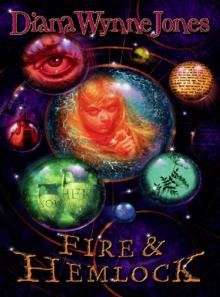 Fire and Hemlock
Fire and Hemlock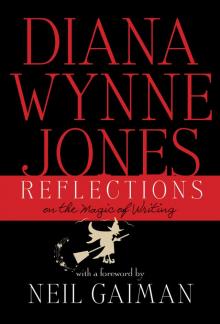 Reflections: On the Magic of Writing
Reflections: On the Magic of Writing The Game
The Game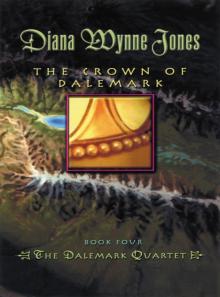 The Crown of Dalemark
The Crown of Dalemark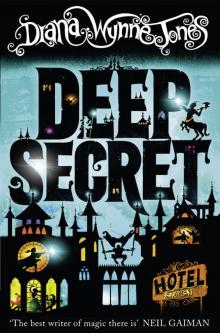 Deep Secret
Deep Secret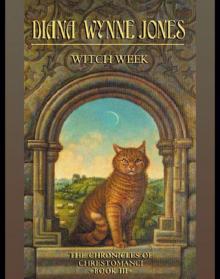 Witch Week
Witch Week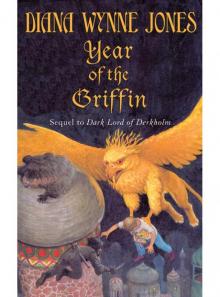 Year of the Griffin
Year of the Griffin Wild Robert
Wild Robert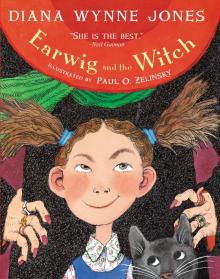 Earwig and the Witch
Earwig and the Witch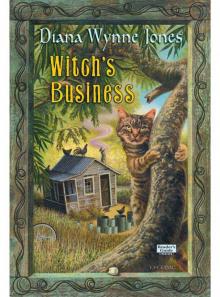 Witch's Business
Witch's Business Dogsbody
Dogsbody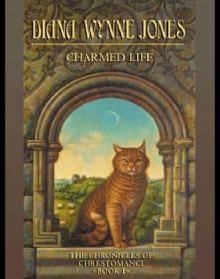 Caribbean Cruising
Caribbean Cruising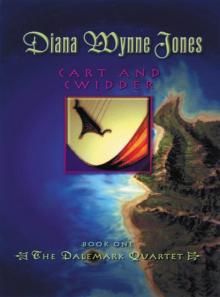 Cart and Cwidder
Cart and Cwidder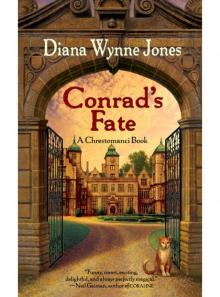 Conrad's Fate
Conrad's Fate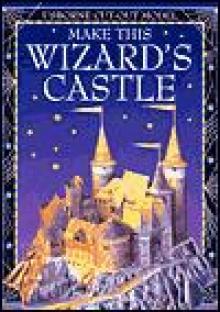 Howl's Moving Castle
Howl's Moving Castle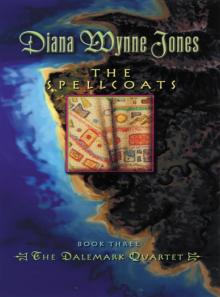 The Spellcoats
The Spellcoats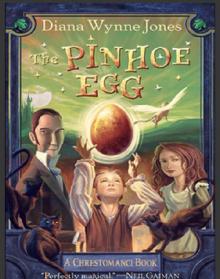 The Pinhoe Egg
The Pinhoe Egg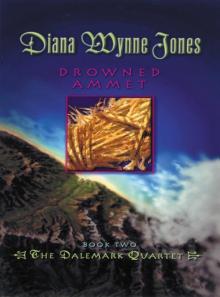 Drowned Ammet
Drowned Ammet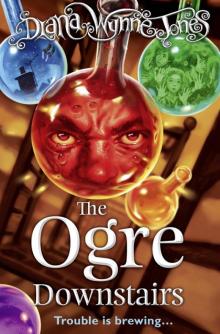 The Ogre Downstairs
The Ogre Downstairs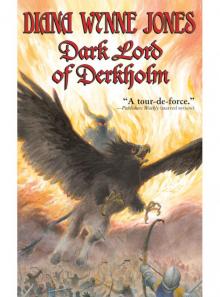 Dark Lord of Derkholm
Dark Lord of Derkholm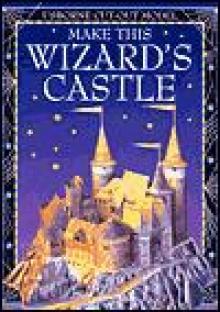 Castle in the Air
Castle in the Air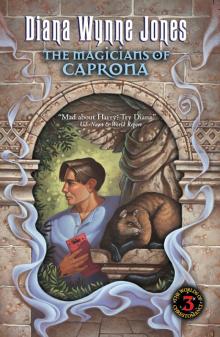 The Magicians of Caprona
The Magicians of Caprona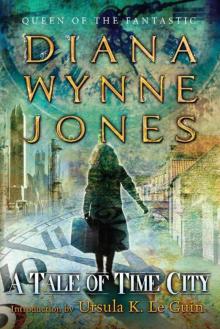 A Tale of Time City
A Tale of Time City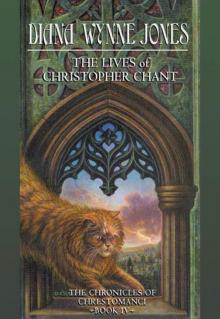 The Lives of Christopher Chant
The Lives of Christopher Chant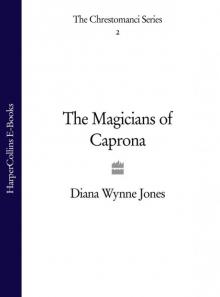 The Magicians of Caprona (UK)
The Magicians of Caprona (UK)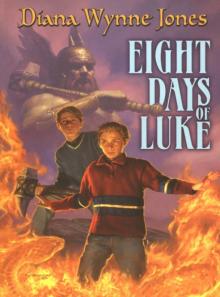 Eight Days of Luke
Eight Days of Luke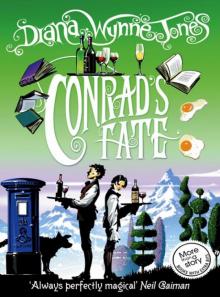 Conrad's Fate (UK)
Conrad's Fate (UK)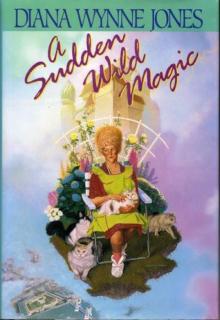 A Sudden Wild Magic
A Sudden Wild Magic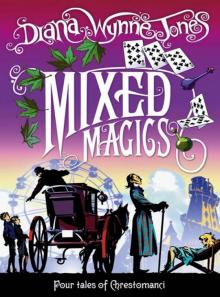 Mixed Magics (UK)
Mixed Magics (UK)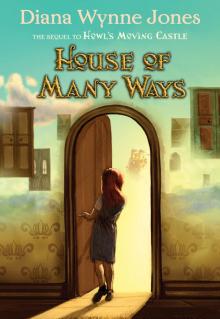 House of Many Ways
House of Many Ways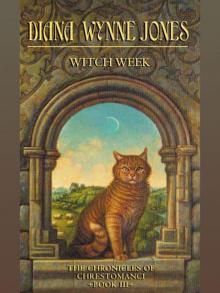 Witch Week (UK)
Witch Week (UK)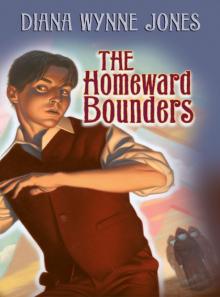 The Homeward Bounders
The Homeward Bounders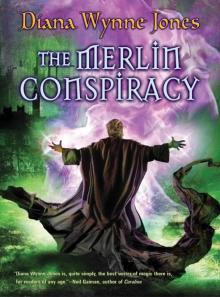 The Merlin Conspiracy
The Merlin Conspiracy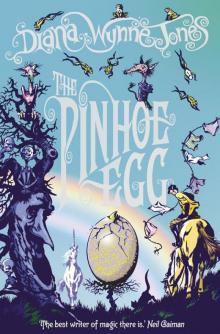 The Pinhoe Egg (UK)
The Pinhoe Egg (UK)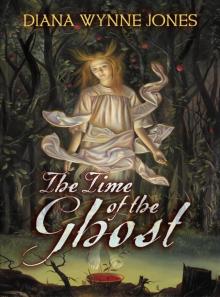 The Time of the Ghost
The Time of the Ghost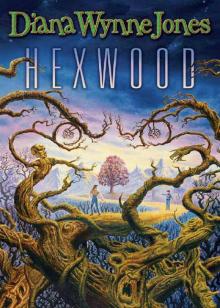 Hexwood
Hexwood Enchanted Glass
Enchanted Glass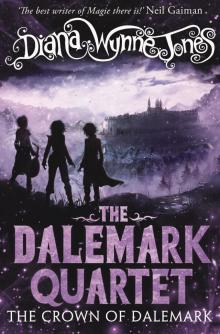 The Crown of Dalemark (UK)
The Crown of Dalemark (UK)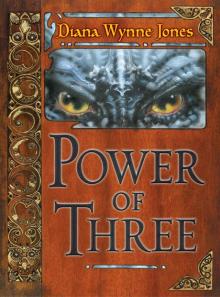 Power of Three
Power of Three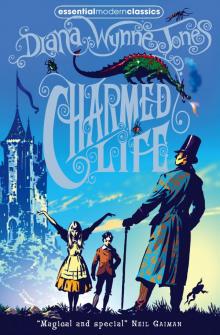 Charmed Life (UK)
Charmed Life (UK)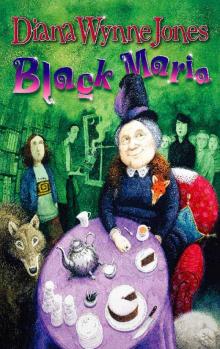 Black Maria
Black Maria The Islands of Chaldea
The Islands of Chaldea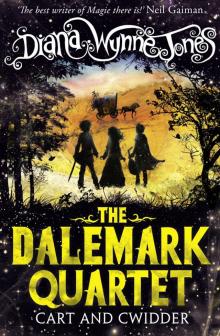 Cart and Cwidder (UK)
Cart and Cwidder (UK)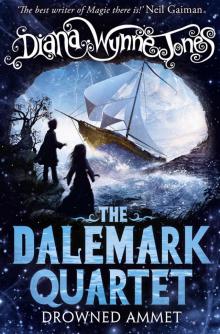 Drowned Ammet (UK)
Drowned Ammet (UK)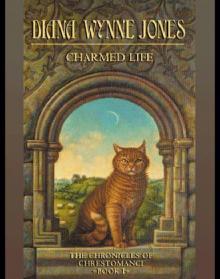 Charmed Life
Charmed Life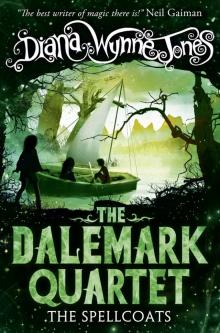 The Spellcoats (UK)
The Spellcoats (UK)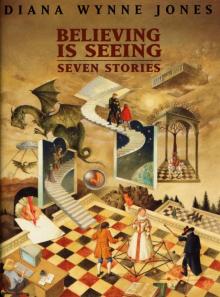 Believing Is Seeing
Believing Is Seeing Samantha's Diary
Samantha's Diary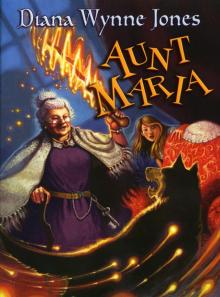 Aunt Maria
Aunt Maria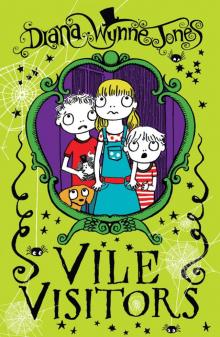 Vile Visitors
Vile Visitors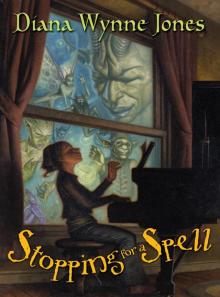 Stopping for a Spell
Stopping for a Spell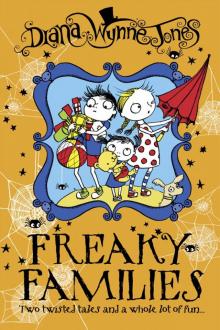 Freaky Families
Freaky Families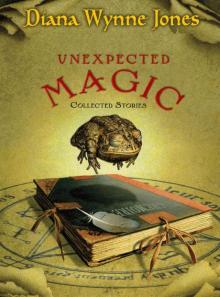 Unexpected Magic
Unexpected Magic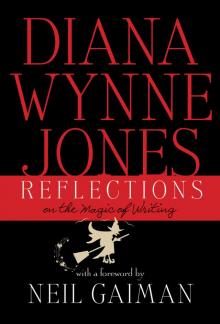 Reflections
Reflections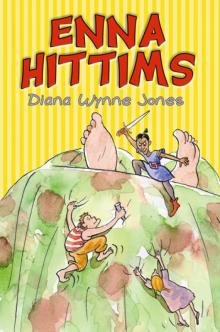 Enna Hittms
Enna Hittms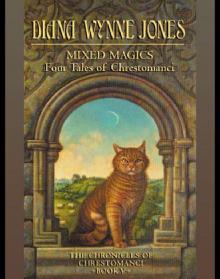 Mixed Magics: Four Tales of Chrestomanci
Mixed Magics: Four Tales of Chrestomanci